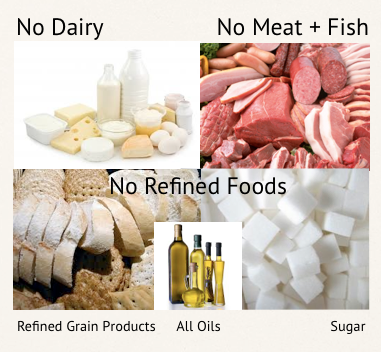4 Ways to Prevent Cancer from the World Cancer Research Fund
/Have you ever thought to yourself “jeeze Trisha’s nutrition recommendations seem a little bit extreme.”
I was having tea with a friend who is about to become a doctor. She asked me “don´t you think a plant-based diet is a bit extreme?” as she washed down a piece of cake with a cup of coffee.
So, am I too "radical" with my diet?
Well, my colleagues and I… Dr. John McDougall, Dr. Neal Barnard, T Colin Campbell, Dr. Pam Popper, Dr. Joel Fuhrman etc., we´re not the only ones recommending a plant-based diet.
The World Cancer Research Fund (the WCRF), also recommends a plant-based diet for the prevention of cancer.
The World Cancer Research Fund has a "special commitment to the most reliable science-based recommendations.” They´re also publicly funded and independent of government.
So what does the World Cancer Research Fund recommend for the prevention of cancer? Here are 4 of their recommendations.
WCRF'S Recommendations for Cancer Prevention
1. Eat mostly foods of plant origin.
- Plant foods should be the center of every meal
- Whole grains and or legumes should be eaten with every meal
This is how you can ensure the 5 daily servings of fruits and vegetables the WCRF recommends, as well as the recommended 25 daily grams of fiber.
2. Avoid foods that promote weight gain.
- Avoid calorie-dense foods
- Avoid sugary drinks including fruit juices
- Consume fast food sparingly, if at all
Calorie-dense foods that promote weight gain include oils, cheeses, meat, fast food and refined foods.
The report states that “diets with high levels of animal fats are often relatively high in energy, increasing the risk of weight gain.”
3. Limit and avoid meat
- Limit beef, pork, lamb, goat and avoid processed meats
- Avoid any meat that has been preserved via smoking, curing, salting or chemical preservation
4. Be as lean as possible.
- Be as lean as possible while maintaining a health, normal weight
The report states that "maintenance of a healthy weight... may be one of the most important ways to protect against cancer. This will also protect against a number of other common chronic diseases."
5. Limit alcoholic drinks.
- Men - no more than two drinks/day if you drink
- Women - no more than one drink/day if you drink
"The evidence on cancer justifies a recommendation not to drink alcoholic drinks. Based solely on the evidence on cancer, even small amounts of alcoholic drinks should be avoided."
6. Aim to meet nutritional needs through diet alone, not supplements.
"Dietary supplements are not recommended for cancer prevention. The evidence shows that high-dose nutrient supplements can be protective or can cause cancer."
7. Limit salt.
"Limit consumption of processed foods with added salt to ensure an intake of less than 6 g (2.4 g sodium) a day."
"The strongest evidence on methods of food preservation, processing, and preparation shows that salt and salt preserved foods are probably a cause of stomach cancer, and that foods contaminated with aflatoxins are a cause of liver cancer."
When you eat a plant-based diet, you drastically reduce the amount of salt you are consuming by eliminating fast foods, refined foods and many animal products from your diet. When you do this, you can add table salt to your food and still meet this recommendation (plus, you might make your veggie meals taste even better!).
8. Make physical activity a part of your daily life.
"Be moderately physically active, equivalent to brisk walking, for at least 30 minutes every day. As fitness improves, aim for 60 minutes or more of moderate, or for 30 minutes or more of vigorous, physical activity every day. Limit sedentary habits such as watching television."
A Special Recommendation for Cancer Survivors
- Follow the recommendations for cancer prevention.
So there you have it, the World Cancer Research Fund´s recommendations to eat a plant-based. They state that "people that eat some form of a vegetarian diet are at low risk of some diseases including cancer."
When my doctor friend asked me if I thought a plant-based diet was extreme, my response was I thought getting open heart surgery or extracting cancerous organs from my body from eating a Western diet, was more extreme than eating potatoes and salad every day, and the WCRF agrees.
Now it´s time for you to put this information to use in your daily life. To get you started, I want you to answer this Take Control Now question and put your answer in the comments section below this video.
When you're finished, please email/share this video and article to a friend or family member. Have them sign-up for free email updates and they'll receive a FREE Healthy Diet Resource Guide delivered right away to their inbox.





